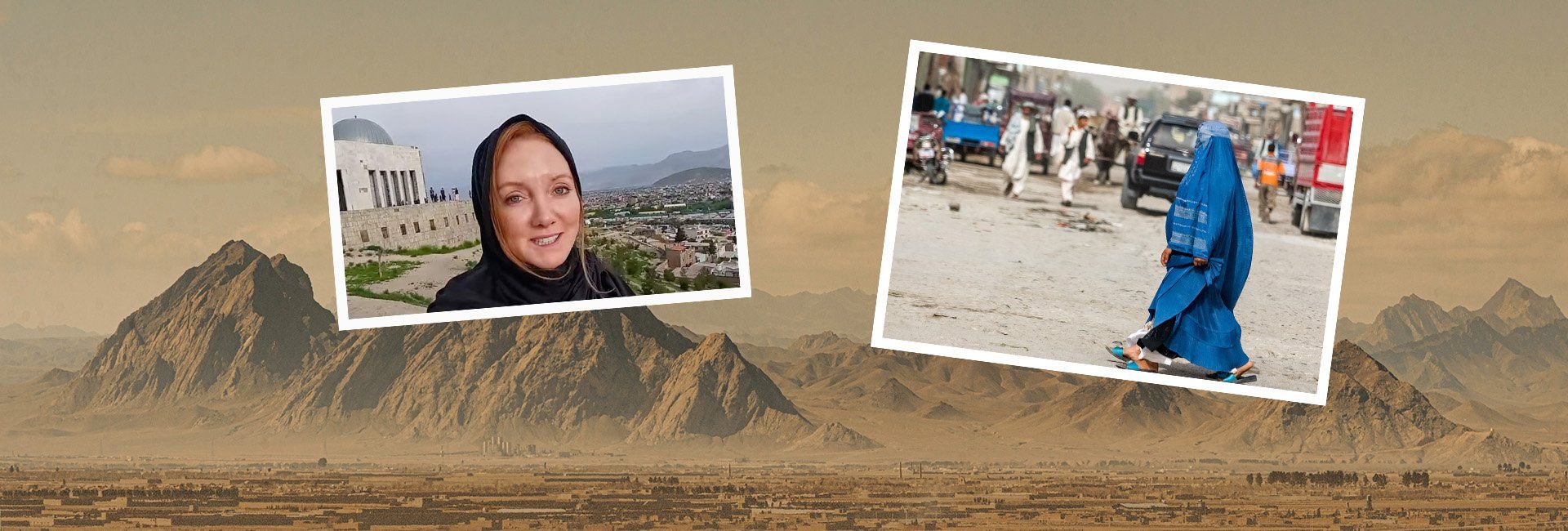Sabrine Nasri
Sabrine is studying a double degree in Media and Social Science. She is interested in what goes on in war-torn countries and is passionate about preventing human rights abuse. Her favourite novel is Paulo Coelho's The Alchemist and she enjoys reading historical fiction novels, especially those by Khaled Hosseini.







“You a TikTokker?” the Afghan man asked the young Western woman as she arrived, selfie stick in hand, at Kabul airport. “No, YouTube,” Carrie Patsalis replied, adding warmly “I love Afghanistan” before she’d left the airport compound.
The influencers and travel vloggers have arrived in Afghanistan, eager to be first to create content about a country that has been off limits for casual travellers for 45 years. And in the wake of their positive storytelling, there has been a surge of tourism to Afghanistan, with over 7,000 people visiting the country in the past year, up from 691 in 2021.
While the numbers remain low, it is a 900 per cent increase in tourists to the country in three years, despite Afghanistan’s ongoing humanitarian crisis created by decades of conflict and war.
So why are people so adamant about travelling there now? This new demographic of tourists travelling to Afghanistan is largely “Australian, North American, West European and Singaporean,” says Caitlin Graham from Young Pioneer Tours, which runs tours to Afghanistan and describes itself as a “a budget tour operator to the places your mother wants you to stay away from”.
She believes the tourists want to “see firsthand how the country functions with the recent turn over to the Taliban”. And that “tourism is the first major step for engaging a country … it’s our change to help make a positive impact for those encountered in the country.”
As the child of refugees who fled Afghanistan, I’ve followed the war, occupation and brutal repression of human rights (especially the rights of women and girls) there closely. I know I wasn’t the only one in our Afghan diaspora community who was concerned when videos promoting the Taliban started to surface.
The new tourism is driven by two main categories, says Mansoor Ramizy, Afghanistan program director with the not-for profit Ideas Beyond Borders. “One is the return of many Afghan diasporas who never got the chance to see Afghanistan during the Islamic Republic of Afghanistan due to insecurity. They return to visit friends and family or take country trips to see the beauty of our nation. Meanwhile, there is also a surge in the second group of tourists who are opportunists. These tourists often disguised as YouTubers or travel influencers visit Afghanistan with the escort and protection of the Taliban. They travel across the country and their Taliban handlers will do whatever they ask of them to do.”
As a result, the Taliban is getting “good press”. One YouTuber fuelling the fire is 25-year-old Miles Routledge, also known as Lord Miles, who rose to fame in 2021, after travelling to what has been listed as one of the world’s most dangerous countries to visit.
Upon his visit, he promoted the Taliban terrorist group with videos that garnered over 1.7 million views. Asked how he felt about the Taliban’s ban on women and girls receiving an education, he said: “It’s an Islamic country, it’s what I expect.”
What you expect? What does that even mean? In what religion does it say it is okay for girls not to go to school, it’s a basic human right. It is this exact framing that fuels the narrative surrounding the religion and spreads misinformation.
In the West, Afghanistan is known as many things – the “Graveyard of Empires”, a safe haven for terrorist groups, a place where opium poppies are harvested with impunity and women have few, if any, rights. For me, Afghanistan is a land of poetry, storytelling, of fables, and proverbs. It’s a country that I have yearned to visit for much of my life, but I see it clearly for what it is.
When the Taliban regained power in Afghanistan in 2021, Afghans across the globe thought it could not get any worse. We were wrong.
Mariam Veiszadeh, an Afghan-born Australian lawyer and CEO of Media Diversity Australia says “the current situation for Afghan women is among the worst in recent history,” comparing it to the Taliban’s previous rule. When coming into power, “they were telling us what we wanted to hear when the Western gaze was fixated on them, but the situation on the ground painted a different picture – with respect to women’s rights.”
Now, she says “[the world] has started to look away”.
And when we did, they introduced their newest repressive law. In July, to mark the Taliban’s three-year anniversary of regaining power, they banned women from speaking in public.
“Wandering Emma”, is a female YouTuber, who gained a following after posting videos about her “solo trip to Afghanistan”. Her YouTube shorts include “Driving through a Taliban checkpoint!” or “Watching volleyball surrounded by the Taliban!” Of the hundreds in attendance, she appears to be the only woman. How would she respond to being banned from vlogging in public? (Newsworthy reached out to Emma Witters but did not get a response).
But it’s not just Western influencers. Afghan YouTubers must also be held accountable when it comes to travel-glossing the Taliban. Ramizy tells me that he is “tired of going home [Kabul] and seeing my family playing on their TV, YouTubers in Kabul streets promoting, advocating, and propagating the agenda of the Taliban to people both inside and abroad.”
The Taliban’s push and promotion of tourism in Afghanistan can be seen as their attempt to legitimise their government and help boost the economy – which is in a dire state due to international sanctions and frozen assets. Working with influencers allows the Taliban to control the narrative about life in Afghanistan. They focus on scenic landscapes and beautiful sites of the country, to divert attention and downplay their human rights abuse.
For tour operator Graham: “We give people the chance to go and make their own conclusions rather than there being a one-size-fits-all answer to the experience women have in the country.”
The Taliban have not been formally recognised as the government of Afghanistan by many countries, and present day Afghanistan has been called, by the United Nations, the most regressive country in the world for women’s rights. At the latest UN General Assembly, Meryl Streep spoke out against the Taliban saying “a squirrel has more rights than a girl”.
It’s frustrating to see the Taliban trying to boost their credibility whilst continuing their oppressive rule. Can tourism truly flourish in a country when half its population remain handicapped?
YouTube vlogger Carrie Patsalis’s vlog "My First Trip To Afghanistan Under Taliban Rule" has had 1.7 million views in the five months since she posted it. After the Taliban banned women from speaking in public, she posted a follow up vlog “Are Women REALLY OPPRESSED In Afghanistan?” which has had 280,000 views. In it, she acknowledges her white Western privilege gives her a freedom Afghan women can only dream of.
My grandparents risked their lives to ensure a better life for their family. It’s scary to think had they not escaped, and had Australia not accepted them, where I would be now? What my reality would be?
Scary, but not hard to work it out. I would be locked in at home, with no reason to leave. I could not speak of my repression, my voice would go unheard. I would remain covered, head to toe. And I could not write down the story of my repression, because, as education is banned for my gender, I would not know how to write.
– Podcast interview by Dominique Lakis-Nash, Lili Tisch-Bostock, Junjun (Isaac) Gao and Laura Thompson